Libya
Voices Unheard: Living with disability in Libya
Khalid Al-Khateb was born in Libya in the 1990s without the use of his legs. Despite wars and economic collapse in his country, the greatest challenge he has faced is trying to function in a world where disabilities are mostly ignored. From Tripoli, Libya, Malik Ghariani has this animated story.
Update on the International Criminal Court’s investigation in Libya
Analysis of Libya’s political process and reconciliation efforts
Turkey-Egypt rapprochement aims to soothe Libya tensions
A rapprochement between Turkey and Egypt, the main supporters of the rival powers in Libya, could offer hope for easing tensions between the Libyan factions. Dorian Jones reports from Istanbul.
Two oilfields in southeast Libya shut down, engineers say
Two oil fields in southeast Libya have halted production and another has reduced it, engineers at the fields told Reuters on Tuesday, showing a plan to reduce output announced on Monday is being put into effect. Reuters’ Alice Rizzo reports.
Expert says Libya’s civil crisis could be complicated by actions taken by the country’s parliament
Members of a Libyan militia group have been arrested at a South African camp
Libyan nationals arrested at what South African authorities call an “illegal military camp”
Italian authorities seize Chinese military drones headed for Libya
Libyan Armed Groups Clash in Capital Tripoli
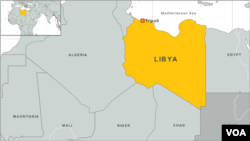
TRIPOLI — Clashes between powerful Libyan armed groups broke out in the capital Tripoli, sparking panic among locals celebrating the end of the Muslim fasting month of Ramadan, local media reported.
The clashes overnight Thursday into Friday lasted for about one hour but claimed no lives, the reports said.
Libya is still struggling to recover from years of war and chaos after the 2011 overthrow of longtime dictator Muammar Gaddafi. Although relative calm has returned to the oil-rich country in the past four years, clashes periodically occur between its myriad armed groups.
Witnesses said they heard exchanges of fire, including from heavy weapons, in Tripoli's Abu Salim neighborhood, an area controlled by the Stability Support Authority (SSA).
Gunmen from SSA clashed with elements of the Special Deterrence Force (Radaa), the media reports said.
Authorities have not disclosed the reasons behind the fight, but local media said it began after the SSA detained Radaa members in retaliation for the detention of one of its members by the rival group.
Both groups released the detainees the same night.
Families who were observing the second day of Eid al-Fitr celebrations had to flee nearby cafes and parks during the clash, the media reports said.
SSA and the Special Deterrence Force evolved from the militias that filled a security vacuum following Kadhafi's overthrow.
The United Nations Support Mission in Libya (UNSMIL) on Friday denounced "the recurring use of violence to settle disputes," in a statement on X.
Condemning "chronic insecurity," UNSMIL called for Libya to "prioritize elections to establish legitimate governing bodies."
"Those responsible must be held accountable," it said.
In Tripoli, the SSA and Radaa groups are not under the direct authority of the ministries of interior or defense, though they receive public funds.
They operate independently and received a special status from the prime minister and the presidential council in 2021.
The groups are most visible at roundabouts and main street intersections, where their often-masked members staff checkpoints, blocking traffic with weapon-mounted armored vehicles.
In August 2023, Tripoli's worst armed clashes in a year left 55 people dead when Radaa and the 444 Brigade clashed.
In February this year, at least 10 people including SSA members were shot dead in Tripoli.
Interior Minister Imad Trabelsi then announced that armed groups in Tripoli agreed to leave and be replaced with regular forces.
He gave no time frame but suggested the measure would be implemented after Ramadan.
Libya is divided between the U.N.-recognized Tripoli-based government and a rival administration in the country's east.
Libya PM’s Residence Targeted with RPGs, Authorities Say

The residence of Libyan Prime Minister Abdulhamid al-Dbeibah was targeted with rocket-propelled grenades on Sunday in an attack that left no casualties, a Libyan minister told Reuters.
The minister, who spoke in condition of anonymity, confirmed in a message that the attack only caused some damage. The minister has not disclosed any further details.
Two citizens said they heard massive explosions near the sea in Tripoli's luxury Hay Andalus neighborhood, where the prime minister’s home is located.
Another citizen said after the massive explosions were heard, heavy security forces with their vehicles were deployed around the area.
Libya has had little peace or stability since a 2011 NATO-backed uprising, and split in 2014 between eastern and western factions, with rival administrations governing each area.
Dbeibah's Government of National Unity was installed through a U.N.-backed process in 2021 but the parliament, in the east, stopped recognizing its legitimacy at the end of that year after a failed attempt to hold national elections, which led to prolonged political deadlock.
Early of March, three key leaders said they agreed on the "necessity" of forming a new unified government that would supervise long-delayed elections.
Dbeibah has vowed not to cede power to a new government without national elections.




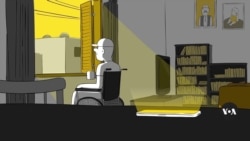


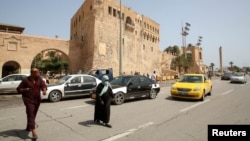

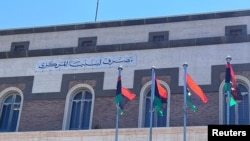
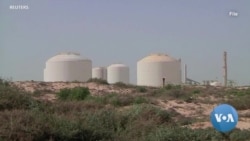
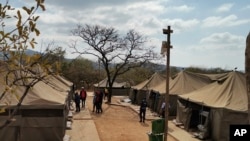
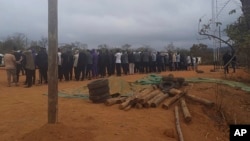


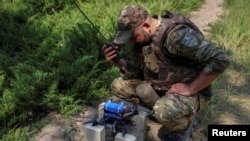

Forum